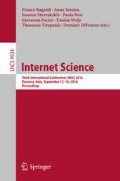Abstract
Today, information and communication technologies (ICTs) are often applied to assist learning processes. Peculiar objectives of ICT use in this topic are to facilitate collaboration and to increase learning through sharing and distributing knowledge. This study aimed to investigate the effects that a small group has on the individual and collaborative learning. A virtual environment was used to study the dynamics of social behaviors in collaborative and non-collaborative experimental conditions. Our results seem to support the hypothesis that social scripts are started, even when people are in non-interactive situations, and this is shown in virtual environments, too. Such outcomes, and the virtual interactions content analysis may suggest useful advices about collective reasoning and e-learning dynamics, which are very relevant topics in the study of web communities and educational communities.
Access this chapter
Tax calculation will be finalised at checkout
Purchases are for personal use only
References
Barros-Castro, R.A., Midgley, G., Pinzón, L.: Systemic intervention for computer-supported collaborative learning. Syst. Res. Behav. Sci. 32(1), 86–96 (2015)
Popov, V., Noroozi, O., Barrett, J.B., Biemans, H.J.A., Teasley, S.D., Slof, B., Mulder, M.: Perceptions and experiences of, and outcomes for, university students in culturally diversified dyads in a computer-supported collaborative learning environment. Comput. Hum. Behav. 32, 186–200 (2014)
Harris, C.B., Paterson, H.M., Kemp, R.I.: Collaborative recall and collective memory: what happens when we remember together? Memory 16(3), 213–230 (2008)
Harris, C.B., Barnier, A.J., Sutton, J.: Consensus collaboration enhances group and individual recall accuracy. Q. J. Exp. Psychol. 65(1), 179–194 (2012)
Nokes-Malach, T.J., Richey, J.E., Gadgil, S.: When is it better to learn together? Insights from research on collaborative learning. Educ. Psychol. Rev. 27, 645–656 (2015)
Roediger, H.L., McDermott, K.B.: Creating false memories: remembering words not presented in lists. J. Exp. Psychol. Learn. Memory Cognit. 21, 803–814 (1995)
Basden, B.H., Basden, D.R., Bryner, S., Thomas III, R.L.: A comparison of group and individual remembering: does collaboration disrupt retrieval strategies? J. Exp. Psychol. Learn. Memory Cognit. 23(5), 1176–1189 (1997)
Maki, R.H., Weigold, A., Arellano, A.: False memory for associated word lists in individuals and collaborating groups. Memory Cognit. 36, 598–603 (2008)
Thorley, C., Dewhurst, S.A.: Collaborative false recall in the DRM procedure: effects of group size and group pressure. Eur. J. Cognit. Psychol. 19(6), 867–881 (2007)
Olszewska, J., Ulatowska, J.: Encoding strategy affects false recall and recognition: evidence from categorical study material. Adv. Cognit. Psychol. 9(1), 44–52 (2013)
Prinsen, F., Volman, M.L.L., Terwel, J.: The influence of learner characteristics on degree and type of participation in a CSCL environment. Br. J. Educ. Technol. 38(6), 1037–1055 (2007)
Bennett, J., Hogarth, S., Lubben, F., Campbell, B., Robinson, A.: Talking science: the research evidence on the use of small group discussions in science teaching. Int. J. Sci. Educ. 32(1), 69–955 (2010)
Ding, N., Bosker, R.J., Harskamp, E.G.: Exploring gender and gender pairing in the knowledge elaboration processes of students using computer-supported collaborative learning. Comput. Educ. 56(2), 325–336 (2011)
Zhan, Z., Fong, P.S.W., Mei, H., Liang, T.: Effects of gender grouping on students’ group performance, individual achievements and attitudes in computer-supported collaborative learning. Comput. Hum. Behav. 48, 587–596 (2015)
Harskamp, E., Ding, N., Suhre, C.: Group composition and its effect on female and male problem-solving in science education. Educ. Res. 50(4), 307–318 (2008)
Sopka, S., Biermann, H., Rossaint, R., Rex, S., Jäger, M., Skorning, M., Heussen, N., Beckers, S.K.: Resuscitation training in small-group setting-gender matters. Scand. J. Trauma resuscitation Emerg. Med. 21(1), 1–10 (2013)
Liu, N., Lim, J., Zhong, Y.: Joint effects of gender composition, anonymity in communication and task type on collaborative learning. In: PACIS 2007 Proceedings, vol. 85 (2007)
Benbunan-Fich, R., Hiltz, S.R., Turoff, M.: A comparative content analysis of face-to-face vs. asynchronous group decision making. Decis. Support Syst. 50(4), 457–469 (2003)
Kreijns, K., Kirschner, P.A., Jochems, W.: Identifying the pitfalls for social interaction in computer-supported collaborative learning environments: a review of the research. Comput. Hum. Behav. 19(3), 335–353 (2003)
Arbaugh, J.B., Benbunan-Fich, R.: The importance of participant interaction in online environments. Decis. Support Syst. 43(3), 853–865 (2007)
Potter, R.E., Balthazard, P.A.: Virtual team interaction styles: assessment and effects. Int. J. Hum. Comput. Stud. 56(4), 423–443 (2002)
Guazzini, A., Lió, P., Bagnoli, F., Passarella, A., Conti, M.: Cognitive network dynamics in chatlines. Procedia Comput. Sci. 1(1), 2355–2362 (2010)
Guazzini, A., Vilone, D., Bagnoli, F., Carletti, T., Grotto, R.L.: Cognitive network structure: an experimental study. Adv. Complex Syst. 15(06), 1250084 (2012)
Meade, M.L., Gigone, D.: The effect of information distribution on collaborative inhibition. Memory 19(5), 417–428 (2011)
Pennebaker, J.W., Chung, C.K., Ireland, M., Gonzales, A., Booth, R.J.: The Development and Psychometric Properties of LIWC2007. LIWC.net.Pennebaker, Austin (2007)
Tausczik, Y.R., Pennebaker, J.W.: The psychological meaning of words: LIWC and computerized text analysis methods. J. Lang. Soc. Psychol. 29(1), 24–54 (2010)
Kirschner, F., Paas, F., Kirschner, P.A.: Task complexity as a driver for collaborative learning efficiency: the collective working memory effect. Appl. Cogn. Psychol. 25(4), 615–624 (2011)
Michailidou, A., Economides, A.: Gender and diversity in collaborative virtual teams. In: Orvis, K.L., Lassiter, A.L.R. (eds.) Computer Supported Collaborative Learning: Best Practices and Principles for Instructors, pp. 199–224. IGI Global, Hershey (2008)
Acknowledgements
This work was partially funded by the European Commission, under the FP7 EINS Open Call Project FOCAL.
Author information
Authors and Affiliations
Corresponding author
Editor information
Editors and Affiliations
Rights and permissions
Copyright information
© 2016 Springer International Publishing AG
About this paper
Cite this paper
Guazzini, A., Cecchini, C., Guidi, E. (2016). Small Group Processes on Computer Supported Collaborative Learning. In: Bagnoli, F., et al. Internet Science. INSCI 2016. Lecture Notes in Computer Science(), vol 9934. Springer, Cham. https://doi.org/10.1007/978-3-319-45982-0_12
Download citation
DOI: https://doi.org/10.1007/978-3-319-45982-0_12
Published:
Publisher Name: Springer, Cham
Print ISBN: 978-3-319-45981-3
Online ISBN: 978-3-319-45982-0
eBook Packages: Computer ScienceComputer Science (R0)

